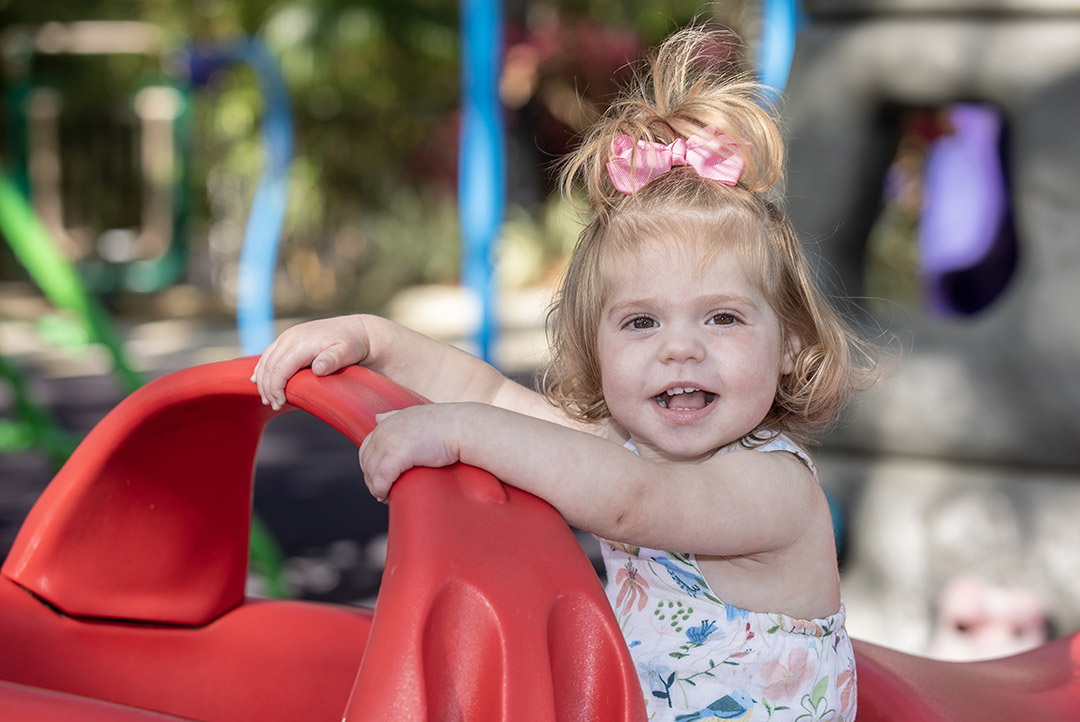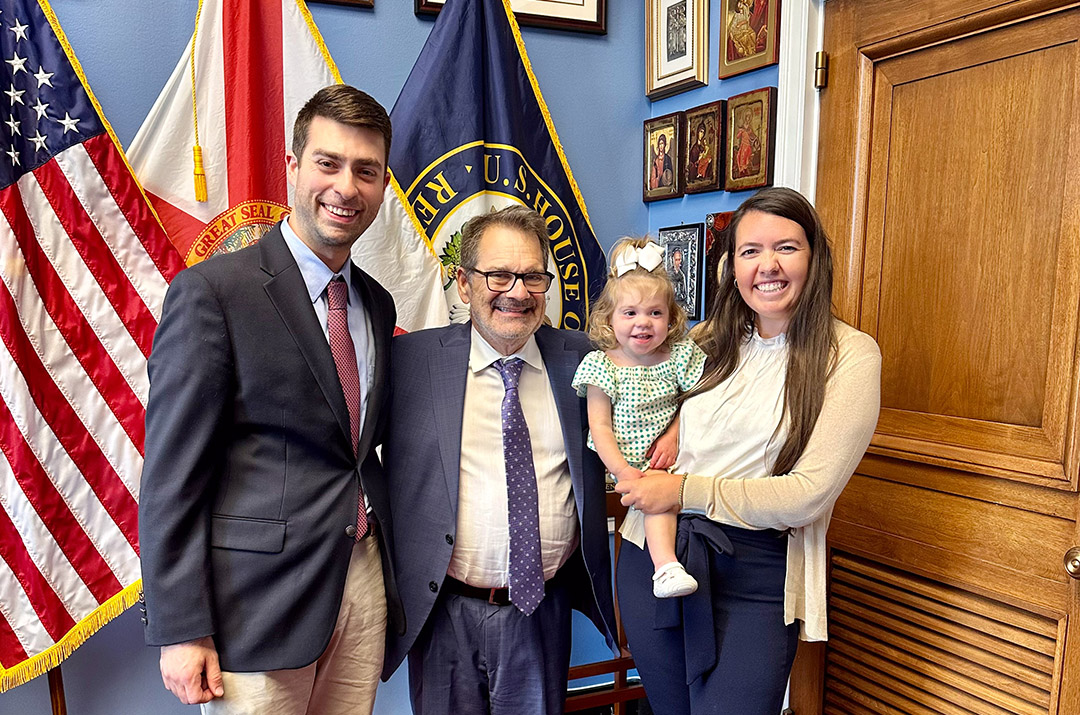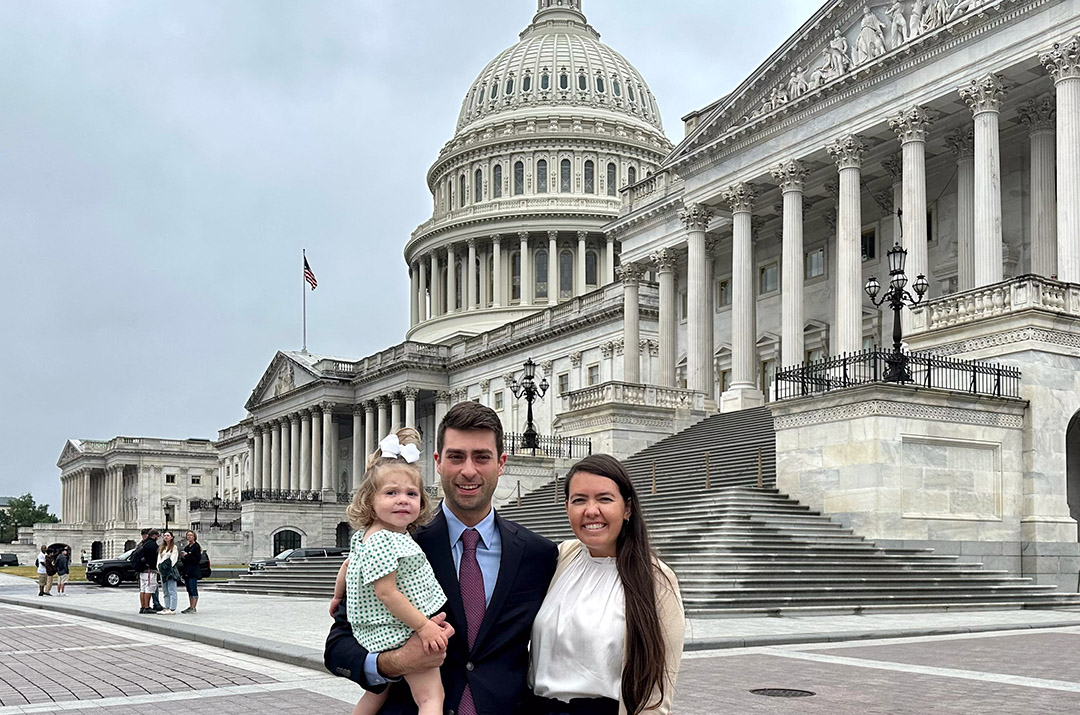Birdie Advocates for Johns Hopkins All Children’s
Birdie and her family recently traveled to Washington, D.C., to share her story as part of the Children’s Hospital Association’s Family Advocacy Day annual event.

Birdie received care in the Center for CDH at Johns Hopkins All Children's Hospital.
Mary and Robert Molloy can’t help but beam when they see their little girl, Birdie, happy, healthy and running through the halls of Congress. The family recently traveled to Washington, D.C., to share Birdie’s story about her congenital diaphragmatic hernia (CDH) diagnosis as part of the Children’s Hospital Association’s Family Advocacy Day annual event.
While today Birdie is thriving, her first couple months of life were quite scary. Mary and Robert already had two other little girls, Olive and Nellie, and felt prepared to have their third daughter in 2021. All of Mary’s prenatal appointments seemed to go as well as planned, seemingly with no issues. The day she went into labor though, was when their world changed. Mary had what seemed to be a normal delivery, but when Birdie came out, she looked blue and wasn’t breathing properly. Born in Tampa, the hospital staff rushed to manually resuscitate her and put Birdie on a ventilator. A few hours later the family was told Birdie had CDH — a major hole in the diaphragm that results in abdominal organs migrating up into the chest — choking off lung growth. Unlike Birdie’s case, the condition is typically spotted at an expectant mother's 20-week prenatal ultrasound and sometimes given low rates for survival.
“I had never even heard of CDH,” Mary says. “In the blink of an eye, our lives just shifted.”
Birdie was immediately transferred by Johns Hopkins All Children’s LifeLine ambulance to the hospital, which houses the largest CDH program in the United States, and has the country’s only dedicated CDH inpatient unit. The unit of surgeons, nurses and other team members are solely focused on CDH care, and achieve survival rates above 90 percent that far exceed national benchmarks. While many families travel to Johns Hopkins All Children’s Hospital’s CDH unit from hundreds or thousands of miles away, the family felt lucky to have the St. Petersburg hospital just a short drive away.
“Dr. Kays was so kind, from the very first moment he came in and sat us down,” Mary says.
 Birdie and her parents Mary and Robert met with members of Congress to share their story as part of the Children’s Hospital Association’s Family Advocacy Day annual event.
Birdie and her parents Mary and Robert met with members of Congress to share their story as part of the Children’s Hospital Association’s Family Advocacy Day annual event.“CDH is a life-threatening defect with a substantial risk of mortality,” adds David Kays, M.D., medical director of the Center for Congenital Diaphragmatic Hernia at Johns Hopkins All Children’s. “Last year we took care of 62 newborns with CDH, from 26 different states. Those families travel here four weeks before delivery to have their child born and cared for at our hospital. When we heard about Birdie’s story, I thought how lucky was it for Birdie, and for us, that she was born just across the bay in Tampa.”
Just six days after birth, Birdie had CDH surgery to repair the hole in her diaphragm. After surgery, she spent the rest of her hospital stay weaning off breathing support. She was released on oxygen but back into the hospital one month later with her same surgeon for completely unexpected bile duct surgery where her gallbladder was removed, and then she was finally taken off of all her oxygen support.
Today, Birdie is an active 1-year-old, doing great and only needs to visit Johns Hopkins All Children’s once a year for her annual checkup with Kays. The family has been immensely thankful for the hospital and it is why they wanted to share Birdie’s story and raise awareness about CDH and other medically complex conditions impacting children at the Family Advocacy Day event.
The annual non-partisan event brings together families from children’s hospitals across the U.S. to meet with members of Congress in hopes they will learn more about the critical need for increased funding and access to care close to home for medically complex children.

Birdie’s family met with U.S. Rep. Kathy Castor and U.S. Rep. Gus Bilirakis, as well as staff from U.S. Rep. Laurel Lee’s office.
“It was such a wonderful experience meeting with the different representatives,” says Mary. “They seemed very interested in not only meeting with Birdie but also listening to how they could be health care advocates for all the other families with children who have health care needs.”
Birdie seemed to be an effective lobbyist throughout the visit as she handed out a personalized baseball card about herself to policymakers and staff, easing the way into the conversation for the adults to discuss the important topics related children’s health. Many could not avoid a smile or laugh as she hobbled over and looked up at them. Her parents were proud to share how Birdie has progressed and say they are grateful to share their story in hopes of advocating for other children receiving care at the hospital.
“Not a single nurse, respiratory therapist or doctor or staff member was anything less than amazing,” Mary says. Rob adds, “They saved our baby.”
